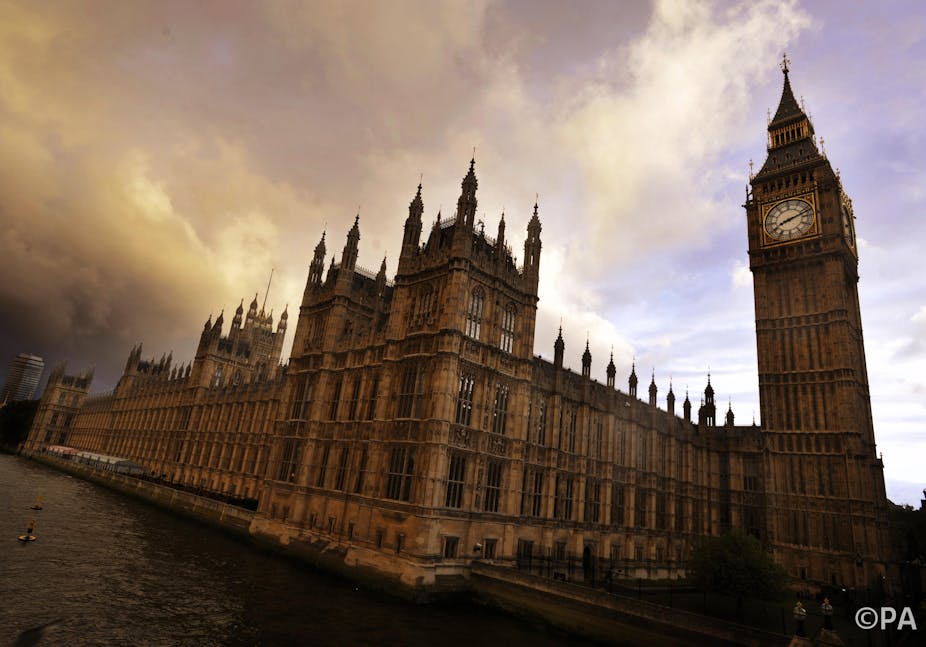The BBC is marking 750 years since the first elected parliament at Westminster with a dedicated “Democracy Day”. Though Westminster is recognised as the cradle of representative democracy, there are indications it is not valued as such by the parliament which currently sits there.
The BBC’s Democracy Day celebration is hard to swallow for a couple of reasons. For one thing, the first “elected parliament” was chosen by a handful of aristocrats with little or no interest in democracy or “the people”.
It’s also a bit rich to claim we all still treasure our elected parliamentary institutions when legislation intended to limit our representative democracy can be passed with apparent ease.
Fixed-term parliament failure
The 2010 elections resulted in the UK’s first hung parliament in nearly 40 years. The government was faced with international pressure to implement severe austerity measures and reduce the country’s budget deficit, while teetering precariously on an uncomfortable union between Conservatives and Liberal Democrats.
Instead of facing constant threats of both parties fragmenting, it seemed better to constitutionally bind them together into the future, by fixing the terms of elected governments. The resulting Fixed-term Parliaments Act (FTPA) introduced legally binding electoral terms of five years.
In reality, the FTPA has had little success in ensuring stability or protecting democratic values. One key aim of the Act was to secure Britain’s AAA credit rating among global ratings agencies such as Moody’s.
Apparently, the mere thought of more democratic engagement through another election would be enough to scare off the world’s leading investment banks. So much for that goal: despite introducing the Act, George Osborne’s treasured AAA rating was lost.
Another argument for the reform was about reducing the UK’s budget deficit. Political stability had to be ensured, so that the coalition could do what was right for the country and institute “eye-watering cuts” to public services the country apparently couldn’t afford (such as libraries, which in reality take up a minuscule percentage of public expenditure).
Yet the coalition government is also on course to miss its targets for cutting the deficit by quite some way.
The main point is that both of these policy failures – and the state of the economy in general – have nothing to do with the threat of an election, a new government, or democratic change. They are due to internal party politics in the coalition, global economic trends, and the particular deficit reduction strategy pursued by the Treasury.
An international precedent
Of course, the dates of elections are fixed legally all over the world. But this is rarely so that elections happen less often, and rather to make sure that elections happen as often as possible. Perhaps, like the US, we should set laws to make sure more elections occur at various levels of society, including citizen initiatives and referendums. That would be democratic.

The risk (averse) society
Let’s just be honest that we know the institutions of democracy – elections, politicians, legislatures – aren’t the most important institutions we have at the moment. Our society values economic stability and public security, and the institutions that ensure those aims.
As social theorist Ulrich Beck noted two decades ago, we live in a “risk society”. We are profoundly scared and fearful of economic collapse, terrorism, environmental and technological disasters, plane crashes, infectious diseases, and other such risks, and we will do anything to secure ourselves against them.
These are, of course, worthy and desirable human goals on their own terms. But let’s not pretend they have much to do with whether elections occur or not, in the west at least. What global corporations do often has a far greater impact on people’s employment prospects, the price of their weekly shop, or their access to social networks on the internet. People live most of their daily lives without ever coming into contact with democratic institutions.
We live in an age where what will keep us safe – or rather, what we think will keep us safe – often takes priority over electing politicians to increasingly marginal legislatures, precisely because we are beginning to realise (albeit implicitly) those institutions simply don’t determine that security in the way they once did.
Perhaps our growing list of insecurities suggests we are beginning to realise that the real action, the real power to keep us safe, is elsewhere beyond parliaments. Perhaps new ways of thinking about what really constitutes “democracy” – ways to influence those who determine our security in the murky world of the global corporate economy – need to emerge in genuinely profound ways to make any difference to our social and economic future.

